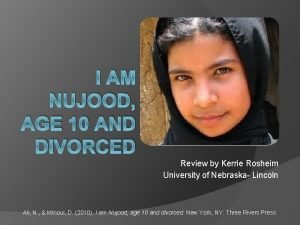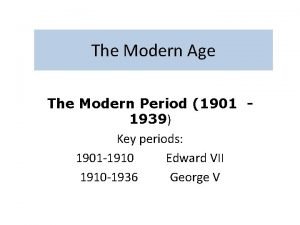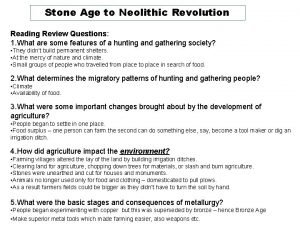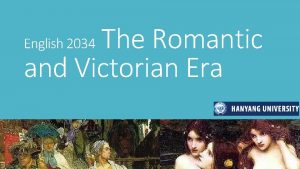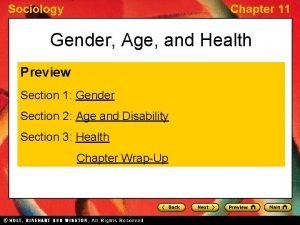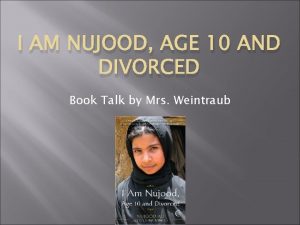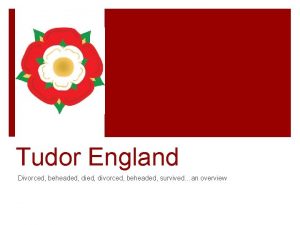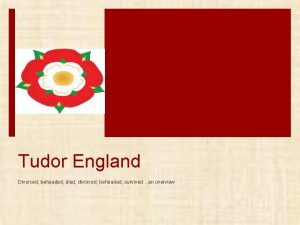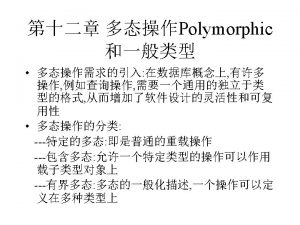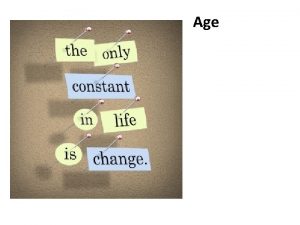I AM NUJOOD AGE 10 AND DIVORCED Review








- Slides: 8

I AM NUJOOD, AGE 10 AND DIVORCED Review by Kerrie Rosheim University of Nebraska- Lincoln Ali, N. , & Minoui, D. (2010). I am Nujood, age 10 and divorced. New York, NY: Three Rivers Press.

CHILDHOOD Nujood Ali’s autobiography tells the story of her growing up in the small village of Khardji, Yemen. She was the fifth of eleven children born to her mother; her father also had a second wife and five more children. She was born at home and does not know her age or birthday for certain as she has no official documentation. Nujood loved playing outside and in the river with her siblings while growing up. Her family would not allow her to walk the long distance and attend school as it was reserved for the boys. At approximately age nine, Nujood’s family was forced to move to the capital, Sana’a, when her sister was raped and her family dishonored in the village. Nujood was able to attend school in Sana’a, loved art and writing her name, and enjoyed playing with her friend, Malak.

MARRIAGE Nujood’s world changed in February 2008 when her father suddenly announced she was to be married to Faez Ali Thamer, a man three times her age whom she had never met. Nujood was ten. The marriage agreement paid a dowry of 150, 000 rials (approximately $750) to her father along with Thamer’s promise not to touch Nujood until a year after her first period. Nujood had very little knowledge of marriage but the agreement was quickly made without her consent and she was taken back to live with her in-laws in her home village of Khardji. Her husband entered her room on her wedding night and raped her. Nujood received no sympathy from her mother-in-law who ignored her screams for help, treated her harshly, and put her to work. Every night, the monster of her husband came to her, beating, abusing, and raping her in what became the nightmare of her life.

DIVORCE After two months of marriage, Nujood’s husband gave in to her cries to visit Sana’a and stay with her family for a few weeks. One morning Nujood snuck off to the courthouse where she found a judge and requested a divorce. Sympathetic to her plight, several judges helped Nujood and female lawyer Shada Nasser, a champion for womens’ rights in Yemen worked on her behalf. Despite her father and husband’s lies in the proceedings, Nujood was surprisingly granted her divorce. Buoyed by international media attention and support, Nujood’s case made her one of the world’s youngest divorcees, brought attention to the practice of child marriage, and inspired other young wives to seek freedom from their own abusive marriages.

MOVING ON Nujood Ali celebrated her first-ever birthday with the staff at the Yemen Times the day she was granted her divorce. Since her newfound freedom, Nujood was named one of Glamour magazine’s 2008 Women of the Year, along with Shada Nasser, and traveled to New York to receive the reward. She returned to live with her parents in Sana’a. Despite some bitter feelings, they try to act as if nothing ever happened. Nujood attends a private school thanks to donated funds and dreams of becoming a lawyer like Shada. She vows to never marry again and feels it is her responsibility to protect her younger sister, Haïfa, from early marriage and the premature loss of her innocent childhood. Nujood’s memoirs became an international bestseller and she finally feels like she has become a little girl again.

CHILD MARRIAGE IN YEMEN Nujood Ali’s story brings the issue of child marriage in Yemen to light. A law passed in 1999 made it legal for parents to give their daughters in marriage before the age of 15, provided the husband promises not to touch his wife until she has reached puberty. This vague provision is subject to interpretation and is rarely respected. Almost half of Yemini girls are married under the legal age of 15. Parents justify this practice because the Prophet Muhammed married Aïsha when she was 9 years old. A Yemini tribal proverb states, “To guarantee a happy marriage, marry a nine-year-old girl. ” According to Sana’a University (2006), early marriages are the reason why Yemeni girls lack access to education as 70% of women in Yemen are illiterate.

OTHER YOUTH ISSUES IN YEMEN Nujood Ali’s story revealed several other issues youth face in Yemen. Her family continually struggles with poverty as her father often does not have work and must provide for 19 people between his two wives. The lack of family planning in their strict Islamic culture contributes to the problem of having more children than the family is able to support. There are few opportunities for employment for Nujood’s older siblings other than peddling goods on the street. Girls frequently become victims of sexual attacks; one of the arguments Nujood’s father made for her marriage was that it would “protect her. ” The Islamic traditions restrict many opportunities for girls such as schooling, clothing, and having a say in marriage. The country experienced regionalized outbreaks of violence as Houthi rebels attempted to overthrow the government, destroying villages and leaving thousands either dead or as refugees. Trying to uphold family honor, of utmost importance, prevents anyone in Nujood’s family from coming to her aid or defending her against the marriage and abuse.

RECOMMENDATIONS Nujood’s story, heartbreaking, fascinating, and well-told, opens our eyes to the daily life of a young girl in Yemen in addition to bringing to our attention the atrocities of child marriage. Her decision to take ownership of her life, courage in facing her husband father, and strength in telling her story is inspiring. Her account provides us with a first-hand glimpse into the many issues young people face growing up in Yemen and similar Arab countries. The reality of her life after divorce contrasts with what we may expect in a fairy-tale ending. She still lives in poverty, confronts challenges to her schooling, and has a limited voice in her strict Islamic culture. Some in Yemen applaud her while others look upon her with shame. Yet, her story brings about hope for confronting the once-thought unshakable tradition of child marriage and reminds us to remember those for whom we are laboring where we call home or around the world- the little girls and boys forced to grow up way too soon.

